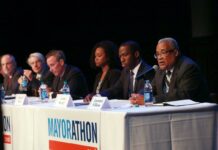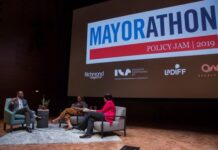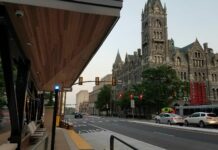Richmond had an eviction crisis before COVID-19 and the pandemic has only exacerbated the problem. To put the looming catastrophe in perspective, consider the following: during July 2020, landlords were awarded an average of $1,787 in each unlawful detainer case. At the time of this writing, there were over 1,200 unlawful detainer cases scheduled to be heard in September. Assuming the average judgment remains roughly the same, this amounts to a total of over $2 million in unpaid rent in September. Not every household facing eviction participates or is eligible for the EDP, nor do they necessarily receive the full 50% of back rent the EDP provides; however, these numbers are illustrative nonetheless. The FY2021 budget allocates $485,000 to the EDP for the entire year. Those funds will be exhausted in roughly two weeks given the current numbers.
Will federal and state programs cover this gap? If not, how will you adequately fund this essential program? What additional solutions do you propose to address the coming wave of evictions?
First, I am thankful for the CDC issuing a federal moratorium on evictions. This demonstrates that they understand the vital connection that we have no hope of getting a handle on Covid-19 if we can’t house our residents. Governor Northam also released $50 million in rent relief funds to help make up the gap however we must make sure people are aware and that the qualifications don’t exclude anyone that may need help. In the emerging “gig” economy, we can’t have eligibility requirements that still reflect the one job one source of income economy. People can be working 2 or 3 jobs and lose a portion of their income and not be able to make ends meet. If they are being misclassified and don’t have access to health insurance and contract Covid-19 that can be a more devastating loss than losing a job. Also I am concerned as are housing organizers such as Pastor Hodge and RISC concerning the requirement of the landlord to participate and how that may leave so many of our residents vulnerable to source of income discrimination. If our Richmond Delegate has been fighting to end source of income discrimination at the state level why would we build our eviction diversion program with that vulnerability. I think we need to expand the strategy of the Federal CARE funds to just more than temporary shelter. The CARE funds allow for funding city initiatives of moving to transitory housing. This is why I am eager to bring HUD’s Housing Plus Pilot program to Richmond. It is a more long-term plan to help those families already evicted prior to the CDC moratorium and the thousands on the waiting list for public housing. We need to utilize the vacant city housing stock to help people recover in the second highest city in the nation for evictions instead of selling them to developers that will only destabilize our housing market even more.
One of the most rudimentary functions of local government is to provide residents with adequate public facilities. Yet, despite paying the highest property tax rate in the region, flooding is routine on the Southside, in Brookland Park, and across the city. Backyards are falling into eroded and unmaintained alleys in the West End. Where sidewalks do exist, they are often inaccessible to people with mobility challenges. How will you make sure these basic and essential services are fulfilled by City Hall? What will you do differently?
As I stated earlier, I am running to implement the Equity Assessment Index that would work in tandem with the new department of transportation to set a baseline of services such as sidewalk and ADA compliance city wide to make sure we are properly prioritizing our residents with mobility challenges. We also have a deep need for an overhaul in our storm water drainage systems. A combination of increased torrential downpour due to climate change coupled with still having an outdated storm water drainage and in some areas a combined sewage water overflow we have put off the inevitable for far too long. Some overflow is due to things as simple as less frequent cleanings of drains due to litter and clutter. We also must admit what many people are stating in the southside and the less developed areas of the city. The tax money for repairs are following where the developers are prioritizing and we still see RVA getting paved streets while Richmond is getting delayed service.
What kind of policy would you seek to help maintain Richmond’s economic and racial diversity? Are there existing programs that are underutilized, for example the Real Estate Tax Relief Program, that could be leveraged more effectively? Would you support a longtime owner occupant program similar to Philadelphia’s?
First, I would like to thank Northside RVA for their endorsement of our campaign for having an effective plan of dealing with the displacement we are seeing in our Northside neighborhoods and beyond. I support expanding the scope and eligibility of the VA homestead exemption program to reflect the model in California and developing a city funded community stabilization fund as seen in Pittsburgh, GA. This should be expanded to reflect more of California’s program. California’s program can either give a tax credit that reduces the assessment value of the house used to calculate the real estate tax (i.e. 75k for single household, 100k for a head of household, up to 175k for seniors). I was speaking to a resident who has benefited from the tax abatement program and the historic tax credit who would like to see a homestead program that depending based on income threshold, rate of appreciation in the area, or length of residence at the location that keeps assessment taxes closer to the original sale price of the home. Black historic neighborhoods such as Pittsburgh in Atlanta, GA have started a model of Community Stabilization funds that assist seniors and community members that are going through a process that they have coined “equity theft.” I think it is important that we talk about the racial wealth gap in light of the legacy of redlining and restrictive covenants to note that gentrification is a war on generational black wealth and it is not just seniors that are being displaced. “Equity Theft” is a calculated action of a city incentivizing (typically through tax breaks to developers) cost-burdening seniors with higher assessments and code enforcement thus leaving them vulnerable to the predatory quick sale market that encourages them to undersell their home to “alleviate” them from soaring taxes and enforcement fees. As I walk through these gentrifying neighborhoods I too see the signs of these “Equity theft” developers who target black seniors on fixed income. There have been reported problem from the Stoney Administration despite expanding the deadline to October 31st that there is a significantly lower amount of seniors taking advantage of the relief fund from last year. As I stand with seniors in court and talk to their neighbors that have seen them get priced out, I am concerned that the amount is lower because many of these seniors have already been priced out or bought out in the process of “equity theft.” This is why any solution going forward must include dedicated housing stability funding to help our long-term residents and their descendants stay in their homes and neighborhoods. We must not build the new “Affordable” RVA on the back of displaced Richmond and have the audacity to call it “equity and opportunity for all.” We also need to introduce a form of rent control for our Seniors living on fixed income as one of my constituents Ms. Lois specifically requested as she doesn’t have much relief available as a senior who doesn’t own her home. I would love to hear more about the long-term owner occupant program in Philadelphia but we cannot talk about comparisons of gentrification of Richmond to North Philadelphia without connecting the expansion of both Temple University and VCU and the disparate impact of displacement of black long-term residents. In 1968, Temple’s Black Free Press named this pattern in their April 4th issue stating “All over Philly “City projects” are springing up…This movement is a concentrated effort on the part of the City Hall system to break-up our community and lump us into convenient, easy to handle, “projects”. This is the direct result of discriminatory practices on the part of City Hall, because it is only we who are forced to move when they decide that they need room.” In 2016 Philadelphia had two of their neighborhoods rank as the most gentrified zip codes in the Nation. A lot of its genrtrification stemmed from the the expansion of universities such as UPenn, Drexler, and Temple. Two city council candidates Nicholas DaSilva and current VCU SGA President Taylor Maloney have long been raising awareness of this trend of displacement in our city through the expansion of VCU and the VCUPD. Over the past years VCU has expanded to an unsustainable rate for both our historic residents and our city coffers. We need to set a limit on how much they can expand within city limits and introduce a Payment In Lieu of Taxes (PILOT) program to make sure they are paying their fair share to remedy the displacement their expansion has caused.
Richmond was denser in 1950 than it is today. Increased density cuts housing costs for residents, preserves the City's limited greenspace, and saves the City money on providing essential services. What changes, either administratively or via ordinance, can the City make to help create dense residential development? What steps can Richmond take to entice, encourage, and facilitate additional residential development? How do we ensure a diversity of housing stock that is accessible to Richmonders at all income levels?
First, I would like to thank the Richmond branch of Our Revolution for endorsing our campaign for prioritizing making affordable and inclusive zoning a reality in our city. First we must acknowledge a historical and a recent truth. Historically we must accept that the Euclidean Zoning that shapes the zoning of our city is based in a racist decision in Amber Realty vs Euclid, Ohio that set up restrictions on what can be built in certain sections of a locality based on the city of Euclid restricting a realty company of building homes for African-Americans because it would have been built in a mostly white area of town. Now for a recent truth, the majority of the 6th district is still zoned for single-family exclusionary zoning and the incumbent has incentivized this type of development throughout her term. A majority of housing in the district is still zoned for single family households and this limits density and access to developing more affordable multi-family housing. Beyond special permitted usage here and there we need to move away from Euclidean based zoning to a more form-based and agile zoning area that 1. creates less of a permitting back up for those who want to build multi-family and 2. Allows us to increase density and greater accessibility to truly affordable housing. We also must make sure that we are not simply displacing long-term residents and justifying their displacement by building higher density replacements on their family homes. Development without displacement is possible. I believe rezoning some vacant industrial zones to be able to be residential where safe and multi-use zoning is implemented.
While the City of Richmond and the Richmond Redevelopment & Housing Authority (RRHA) are subject to federal regulations and budget allocations, there is nothing preventing the full engagement and partnership between these governing bodies and the residents they serve. Unfortunately, the history of public housing in Richmond is a history of distrust, betrayal, and silencing of public housing residents themselves. Like many cities across the nation, Richmond intentionally built highways to segregate and isolate public housing from the rest of the city, effectively preventing its residents from participation in the city's prosperity. Richmond used Urban Renewal to demolish public housing units without a one-to-one unit replacement which resulted in the physical and emotional destruction of public housing neighborhoods. While this is the history of Richmond's public housing, there is nothing that mandates that it also be the future. If elected, how will you work with public housing residents? How will you ensure that residents get to decide their own collective futures rather than having a government entity decide what is best for them?
This question is not a hypothetical for me. Last year I worked with Creighton court residents, Legal Aid Justice Center, and Senator Jennifer McClellan to help pass SB708 that gives tenants a right to at least 12 months of notice from Housing Authorities before they can even apply for demolition or take any action toward disposition of the housing stock. This legislation requires a robust, transparent, and genuine community input process that notifies tenants of their legal rights, the plan for their relocation, and connection with organizations that can assist them in the process. It is tragically the case that displacement of our neighbors in public housing is not just the history of the RRHA in actions such as Urban Renewal, it is also the current plan of the RRHA. In their 2020-2021 PHA plan they are proposing to apply to demolish ALL 3,155 units of public housing projects in the city in November 2020 to circumvent the fair process SB708 would require of them when it takes effect in January 2021. They are not supporting 1:1 Brick and Mortar replacement as is the best practice and the request of the late and beloved community organizer Lillie Estes. Instead they are looking to sell this to the private market and send people out into a market known to discriminate on the basis of source of income. I have submitted public comment to the RRHA’s annual plan, notified Senator McClellan’s office of the RRHA’s attempt to circumvent our equitable legislation, and encourage everyone to write your city council member, state senator, delegate, and Congressman to tell the RRHA to at least wait until SB708 is in effect to apply for demolition. I am running to ensure under my watch such deceit and lack of transparency doesn’t go without proper consequence. Seeing how much the profit motive of the redevelopment authority has consistently threatened the livelihood of their tenants in order to sell to the highest bidder, I would propose beginning the process of separating the Redevelopment Authority from the Housing Authority as cities such as Baltimore, MD did after seeing similar patterns of conflicts of interest.







